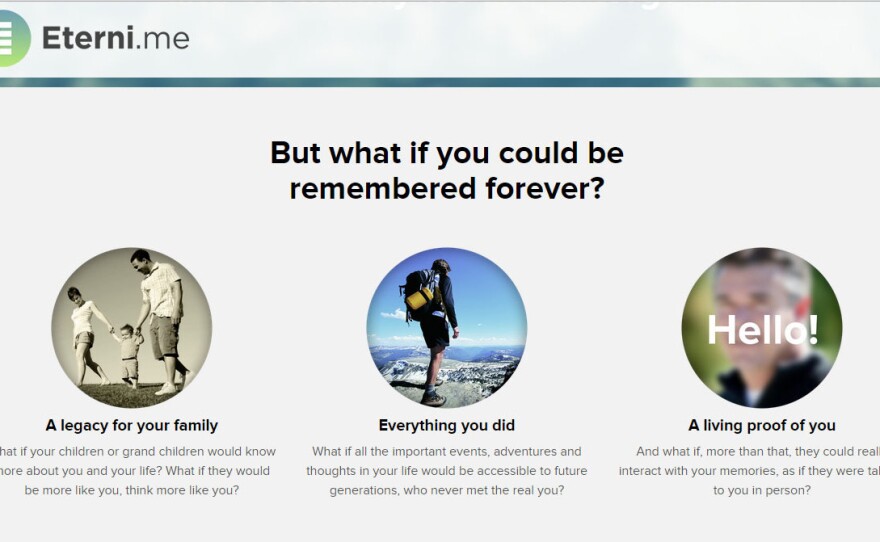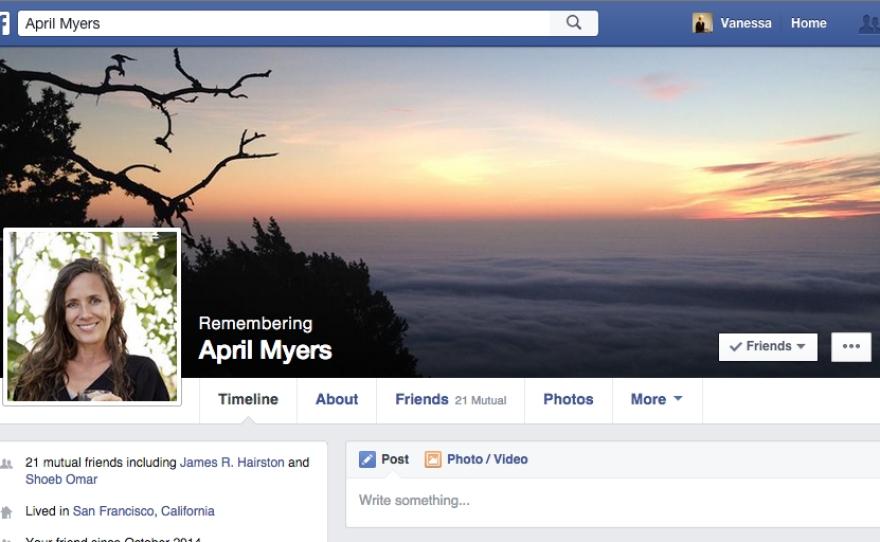
Social Media platforms are getting closer to answering the question: What happens to our online accounts after we die? Facebook, Google and other popular services are offering more control over how we are remembered online. And at least one startup is looking at ways of using artificial intelligence to keep us alive virtually — long after we're gone.
Facebook announced Thursday that it is adding a new "legacy contact" feature — think of it as an emergency contact for your account in the case of death. As before, Facebook says the account of a deceased user will change to a "memorialized" status. But now, depending on the preferences the user has selected while they've living, Facebook says a family member or friend can:
"Write a post to display at the top of the memorialized Timeline (for example, to announce a memorial service or share a special message)
-
"Respond to new friend requests from family members and friends who were not yet connected on Facebook
-
"Update the profile picture and cover photo"
Previously, Facebook has been strict on refusing account access to family members of the deceased.
This announcement follows several other moves from companies attempting to grapple with the legal and emotional challenges of the digital afterlife:
- Google introduced the Inactive Account Manager tool to protect the privacy of the deceased.
- Yahoo Ending from Yahoo Japan also allows the living to prepare by crafting posthumous emails, canceling subscriptions and curating videos and photos to share when they're gone.
- We've already seen the emergence of QR codes on headstones, linking visitors to personalized Web pages for the deceased.
It's not just a solution for confidentiality and the grieving process. These new models satisfy our fears of dying, says University of Arizona psychologist David Sbarra. "For centuries, humans have tried to battle immortality," he says.
"Culture is a manifestation of peoples' efforts to symbolically make themselves permanent," he says. "So we have technological advancements that can then ward off fears of our own mortality."
A startup called Eterni.me offers an ambitious and perhaps creepy experience to quell this universal anxiety. It lets people continue to communicate with a digital replica of their loved ones after they die. Eterni.me plans to let you curate your own immortal avatar while you're living and choose who you make it accessible to when you pass on.
"We all pass away sooner or later, leaving only a few memories behind for family, friends and humanity—and eventually we are all forgotten," reads the website's landing page. "But what if you could be remembered forever?"
Though the website is sparse, Eterni.me's concept has already evolved from a chatbot-navigated site to a 3-D digital avatar that mimics your personality. The startup's motto: "Simply Become Immortal."
The website adds:
"Eterni.me collects almost everything that you create during your lifetime, and processes this huge amount of information using complex Artificial Intelligence algorithms. "Then it generates a virtual YOU, an avatar that emulates your personality and can interact with, and offer information and advice to your family and friends, even after you pass away."
Early reactions called it creepy and likened the concept to Black Mirror, the popular British TV series set in a dystopian tech-driven future. One episode revolves around a widow resorting to a service similar to what Eterni.me promises. Fragile with grief, she turns to an online service that connects her with her late husband through instant messaging, phone calls — and more.
But Eterni.me doesn't see this as simply science fiction. The company wants to make virtual immortality a reality.
As co-founder Marius Ursache told The New Yorker last year, Eterni.me launched early to gauge public interest:
The company plans to store data from Facebook, Twitter, e-mail, photos, video, location information, and even Google Glass and Fitbit devices. While you are living, you can curate and add to this material; you can also choose privacy settings and determine what information you want stored and made public. Eterni.me then allows you to create a list of people who will be contacted and given access to your account in the case of death, giving your descendants quick and easy access to that Instagram pic of your latte or a detailed history of your Facebook pokes. The service's defining feature is a 3-D digital avatar, designed to look and sound like you, whose job will be to emulate your personality and dish out bits of information to friends and family taken from a database of stored information. A user will be encouraged to "train" its avatar, through daily interactions, in order to improve its vocabulary and conversational skills. Eterni.me's co-founder, Marius Ursache, thinks of it as a more advanced version of Siri, who, ten or fifteen years from now, will be able to "respond to questions more naturally, and learn from every conversation you have with her."
Ursache said he plans to bring on a psychologist to address the more sensitive issues. As The New Yorker reported:
[Ursache] describes Eterni.me more as a library of material. 'The avatar acts as a librarian, helping users make sense of the stored information,' he said. 'We're not trying to replace the person who died.' "
Emma Bowman is an intern with NPR Digital News.
Copyright 2015 NPR. To see more, visit http://www.npr.org/.






